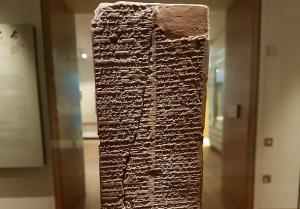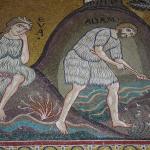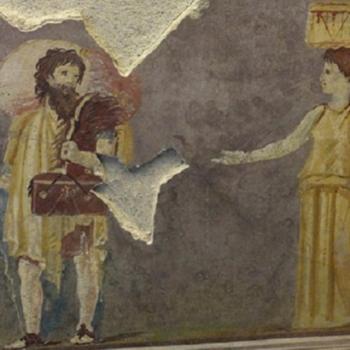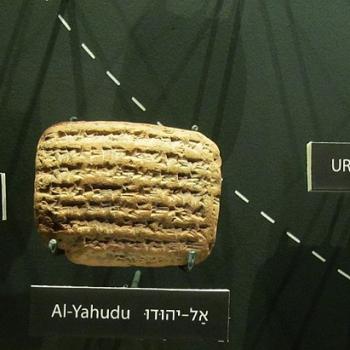What does the name Methuselah mean? And how do we make sense out of the vast number of years he is reported to have lived?
As Richard Hess, Ephraim Speiser, and others have demonstrated, the names on the genealogies in Genesis 4-5 are far older than even the names dating to the patriarchal age. One name worthy of investigation is the name of the longest living man in Genesis.

We are told in the postscript to Moses’ life that Moses lived to be 120 years old, yet at the time he died, his lah was not diminished. The Greek and Latin translate the word as if it were lehi or “jaw,” leading the Greek version to read “his jaw was not deteriorated,” and the Latin to read “he had not lost his teeth.”
Our Bibles translate this word as “vigor” or “life force.” The word lah literally means “sap,” that is, the moisture that characterizes a living tree as opposed to a dead one. The related adjective is used for “fresh” bowstrings to tie up Samson (Judges 16:7-8), “fresh” grapes (Numbers 6:3), “fresh” wooden rods (Genesis 30:37), and “green” (as opposed to dry) trees (Ezekiel 17:24, 21:3).
Used here at the end of the Torah to describe what Moses (who was a human being rather than a plant or a tree) still had, “vitality” seems to be a good word to translate this word. And herein, I believe, lies the clue to the meaning of Methuselah’s name. Methuselah = Mutu-she-lah = “Man of Vitality,” an appropriate name for the reportedly longest-lived guy on the list. (Genesis 4, by the way, makes no mention of ages for the descendants of Cain.)
But now, how do we accept the Bible’s word on the subject as anything other than fiction? We have no hard evidence for humans who have lived longer than the outside limit of 120 years suggested by Genesis 6:3. And yet, even today’s science has only soft-tissue tools for determining the age of a human for whom bones and teeth are fully developed (see http://aboutforensics.co.uk/forensic-anthropology/). How would we recognize the remains of a 900-year-old human if we found them?
There is the young earth theory to explain large ages in Genesis, suggesting that earth’s atmosphere was thicker before the Flood, which would have lessened the amount of cosmic radiation which accelerates aging. While I am skeptical of the claim that conditions in the universe are the same as they’ve always been, I am also skeptical of claims that they are radically different, unless such claims are accompanied by evidence. To substantiate a thicker atmosphere in ancient times that screened out much more radiation than the atmosphere we have at present would for me require more evidence than we have, although I would welcome such evidence if it could be found.
I have a different suggestion, which I offer as wild speculation, a theory that is admittedly questionable, but better than any other explanation out there. I take a clue from the Assyrian and Sumerian King Lists, the closest parallels we have to Genesis 5 in the Biblical world. These lists also testify to large ages before the Flood, ages that dwarf the Bible’s ages by comparison. The oldest character on the Sumerian list is Enmenluanna (43,200years old), but the runner-ups include Dumuzi and Alalgar (36,000), and Alulim and Enmengalanna (both 28,800). Both in Genesis and on the King Lists, the ages go way down after the Flood (1,500, 1,200, 900-600).
(By the way, the modern consensus of both liberal and conservative scholars alike is that the genealogies in Genesis 5 and 11 are selective. They contain gaps. X is often not the immediate father of Y, but is Y’s ancestor, perhaps several generations removed. There are exactly ten generations between Adam and Noah, and between Noah and Abraham. If we take the chronology strictly, Noah would have lived until Abraham was 60 years old. Therefore, most Bible-believing Christians no longer try to do the math to date the creation of Adam to 4004 BCE.)
Kenneth Kitchen (On the Reliability of the Old Testament) does some tentative speculation on what can explain these large ages, using evidence from the Sumerian King List, where two notes in the margin indicate that the scribe was multiplying years of a king’s reign by 60 (their numbering system was based on 60). In fact, the large ages divide easily by 600. Kitchen tries arbitrarily dividing the pre-Flood ages by five, and gets “normal” dates for their first child (all except Noah), and high but not-so-high ages at death. He concedes that in the Bible we are not dealing with reigns of kings or dynasties, but individuals.
Taking a clue from Kitchen, what if we tried dividing the numbers by six? One possible reason for such large ages may be that numbers that were originally base ten were read as base 60. See John Walton, https://www.researchgate.net/publication/270360680_The_Antediluvian_Section_of_the_Sumerian_King_List_and_Genesis_5. Such an approach could help explain the extreme ages in the text, while taking the narrative seriously as a truthful account of still record-busting ages for genuine pre-historic figures.
Yes, the weakness of my suggestion is that it may give the impression that the Bible’s figures are in error. But Biblical inerrancy has always insisted that the hypothetical original texts are what we hold to be authoritative and trustworthy. When God allows texts to depart from the original, God provides clues to help us reconstruct the original. Such reconstructions should not be sought lightly, but only for the strongest reasons. I would imagine that if Hodge and Warfield, the patriarchs of Biblical inerrancy, were available for comment, they might well approve the theory that I am suggesting.
“Man of Vitality” – what better name for a man who lives longer than anyone in historic or prehistoric times? Yet Isaiah 65:22 promises that when God creates a new heaven and a new earth, our days will be “like the days of a tree” (presumably a bristlecone pine rather than a Bradford pear!). And because of the resurrection of Jesus Christ, we have reason to believe that this promise is a huge understatement, aimed at an audience who could barely conceive of life in all its fullness that will last forever.
















